#margaret norton
Text
Sir Thomas Boleyn was close to his mother, with Margaret writing a letter to him that passed conduct of her legal case concerning her inheritance over to him. In it, she confirmed that ‘I pray and heartily desire you that you will do for me in everything that you shall do for me after as you think best, I will, on my part, affirm and rate it in as like manner as though it were mine own deed’. Unfortunately no evidence of her education survives, although she was certainly present at Hever during some of her granddaughter’s formative years.
Arguably, Sir Thomas Boleyn’s wife, Elizabeth, may have been an even greater influence over her daughter’s education. Elizabeth was, in her youth, referred to as ‘sage’, with one of her half-sisters recalled for her learning. It may well have been she who helped arrange an unusual level of education for Anne.
The Boleyn Women, with Elizabeth Norton.
26 notes
·
View notes
Text
[...]
Amy March : Well, I believe we have some power over who we love, it isn't something that just happens to a person.
Theodore 'Laurie' Laurence : I think the poets might disagree.
Amy March : Well, I'm not a poet, I'm just a woman. And as a woman I have no way to make money, not enough to earn a living and support my family. Even if I had my own money, which I don't, it would belong to my husband the minute we were married. If we had children they would belong to him, not me. They would be his property. So don't sit there and tell me that marriage isn't an economic proposition, because it is. It may not be for you but it most certainly is for me.

—Amy March's feminist speech on Little Women, by Greta Gerwig. (Film adaptation from Louisa May Alcott's book "Little Women"). (2019 movie adaptation).
#little women#amy march#jo march#beth march#meg march#laurie little women#margaret march#greta gerwig#florence pugh#saoirse ronan#timothée chalamet#emma watson#eliza scanlen#meryl streep#laura dern#james norton#louis garrel#books#tumblr#louisa may alcott#alcott sisters#abigail may alcott kieriker#anna alcott pratt#elizabeth sewall alcott#literature#poetry#poems on tumblr#feminist#feminism#women rights
9 notes
·
View notes
Text

Hikaru Hoshi-John Norton-Margaret O´Brien "The eyes of two people" (Futari no hitomi) 1952, de Shigeo Nakaki.
2 notes
·
View notes
Text
If, at birth, our Tudor Everywoman was a princess named Elizabeth, and at death a queen named Elizabeth, in between she was – among many other people – a daughter named Anne Boleyn, a servant girl-turned-prophetess named Elizabeth Barton, a businesswoman named Katherine Fenkyll, a widow named Cecily Burbage, a rebel named Margaret Cheyne, a heretic named Anne Askew, and an expatriate of advanced years named Jane Dormer. These particular names have lived on in the history books, and they provide major nodes in a network whose 'minor', but no less illustrative, points comprise much of what follows: the poor wool-spinners of East Anglia, the 'witches' of Surrey and the female apprentices of Bristol; the women who taught and those who fostered learning; the women who vowed to remain chaste and the women who made a living from sex; the women who kept their communities morally upstanding and the women who were driven to slander, thievery and murder; the women whose horizons seemed sunlit, and those whose lives ended in despair, in a noose tied by their own hands.
— The Lives of Tudor Women (Elizabeth Norton)
#book quotes#elizabeth norton#the lives of tudor women#history#tudor period#britain#england#elizabeth tudor#elizabeth i#anne boleyn#elizabeth barton#katherine fenkyll#cecily burbage#margaret cheyne#anne askew#jane dormer#suicide tw
57 notes
·
View notes
Note
do you have any good book recommendations for someone studying Margaret Beaufort?
Hi! The ultimate Margaret Beaufort biography is Jones & Underwood's The King’s mother: Lady Margaret Beaufort, Countess of Richmond and Derby. I have read some other works by Jones on the Beaufort family but I haven't been able to read his (and Underwood's) bio because it's quite pricy and I can't find it online anywhere (and there's no e-book edition sadly).
There are a couple of pop history biographies that are more accessible. Tallis' biography (2019) is alright overall, but the extent of her use of secondary sources (and secondary sources such as Alison Weir) was disappointing and annoying. Norton (2010) used a wider range of primary sources but I couldn't agree with many of her conclusions/arguments after looking at her evidence (eg: she says Margaret and Elizabeth of York were rivals). I think I've enjoyed Tallis' biography a bit more. Lauren Johnson (who's recently written a biography of Henry VI) is writing a Margaret Beaufort biography at the moment but we'll have to wait and see.
What I would really like to get is a study on Margaret's role as the king's mother (kind of like what Laynesmith did in The Last Medieval Queens and Warnicke did in Elizabeth of York and Her Six Daughters-in-Law, both studies focused on queenship). I would like to read about her activities as a married femme sole and vowess: her transactions of land, her pursuit of feudal rights, her religious and educational patronage, her translations and printing commissions, her role as arbiter of the king's justice in the Midlands, etc.
Biographies end up too vague about those topics because they inevitably talk more about personal life (and Margaret had plenty of drama in her life). I would love to get a focused study, maybe even one that also analysed Cecily Neville's role as the king's mother. So much of Margaret's role and participation mirrored Cecily's yet there's this misconception that Margaret was too indulged by her son. It would be nice to actually compare the two king's mothers (Laynesmith, I'm begging you this would be right in your lane).
To go back to your question, I also recommend the following articles:
“Margaret R”: Lady Margaret Beaufort’s Self-fashioning and Female Ambition by Sally Fisher in Virtuous or Villainess? The Image of the Royal Mother from the Early Medieval to the Early Modern Era
Margaret Tudor, Countess of Richmond, and Elizabeth of York: Dynastic Competitors or Allies? by Retha Wanicke in Unexpected Heirs in Early Modern Europe
Translation, Self-Representation, and Statecraft: Lady Margaret Beaufort and Caxton's Blanchardyn and Eglantine (1489) by Anne Bartlett
Lady Margaret Beaufort and the Wives of Henry VIII by Valerie Schutte in Mary I and the Art of Book Dedications
Wishing you a nice reading! 🌹x
#ask#anon#margaret beaufort#historian: michael jones#historian: nicola tallis#historian: elizabeth norton#historian: retha warnicke#historian: valerie schutte#historian: sally fisher#historian: anne bartlett
23 notes
·
View notes
Text
Is it too late to wish for this special to be A Christmas Carol: Doc Martin Style?
Like, in this episode doctor Ellingham learns about his mother's death. Her, aunt Joan and Christopher could be great Three Spirits of Christmas. Christopher would be the Ghost of Christmas Past, Joan - as someone deeply connected to Portwenn - would be the Ghost of Christmas Present, and Margaret - who tried to "reconcile" with her son since her future was uncertain at the time - would be a Ghost of Christmas Future.
#doc martin#martin ellingham#margaret ellingham#christopher ellingham#joan norton#aunt joan#a christmas carol
2 notes
·
View notes
Text
BAYREUTH 2023: PARSIFAL (Schager, Zeppenfeld, Welton, Shanahan, Garanča, Kehrer; Scheib, Heras-Casado)
L’estrena de la nova producció de Parsifal que ha inaugurat fa tres dies el Festival de Bayreuth 2023 anava envoltada del misteri i l’expectació per la proposta escènica de Jay Scheib (això no és gens original) i pel sorprenent encàrrec d’atorgar la direcció musical de la inauguració i d’una òpera tan bayreuthiana, al director granadí Pablo Heras-Casado, una aposta arriscada i la segona vegada…
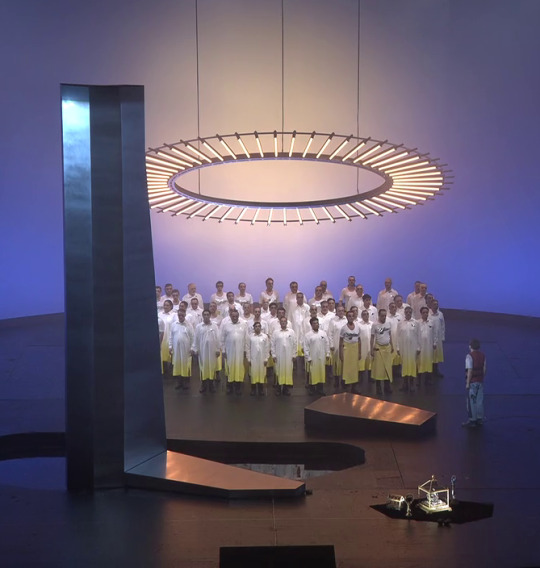
View On WordPress
#Andreas Schager#Betsy Horne#Camille Schnoor#Chor und Orchester der Bayreuther Festspiele#Derek Welton#Eberhard Friedrich#Elina Garanča#Evelin Novak#Garrie Davislim#Georg Zeppenfeld#Jay Scheib#Jens-Erik Aasbø#Jordan Shanahan#Julia Grüter#Margaret Plummer#Marie Henriette Reinhold#orge Rodríguez-Norton#Pablo Heras-Casado#Parsifal#Richard Wagner#Siyabonga Maqungo#Tobias Kehrer
0 notes
Text






JSTOR Articles on the History of Witchcraft, Witch Trials, and Folk Magic Beliefs
This is a partial of of articles on these subjects that can be found in the JSTOR archives. This is not exhaustive - this is just the portion I've saved for my own studies (I've read and referenced about a third of them so far) and I encourage readers and researchers to do their own digging. I recommend the articles by Ronald Hutton, Owen Davies, Mary Beth Norton, Malcolm Gaskill, Michael D. Bailey, and Willem de Blecourt as a place to start.
If you don't have personal access to JSTOR, you may be able to access the archive through your local library, university, museum, or historical society.
Full text list of titles below the cut:
'Hatcht up in Villanie and Witchcraft': Historical, Fiction, and Fantastical Recuperations of the Witch Child, by Chloe Buckley
'I Would Have Eaten You Too': Werewolf Legends in the Flemish, Dutch and German Area, by Willem de Blecourt
'The Divels Special Instruments': Women and Witchcraft before the Great Witch-hunt, by Karen Jones and Michael Zell
'The Root is Hidden and the Material Uncertain': The Challenges of Prosecuting Witchcraft in Early Modern Venice, by Jonathan Seitz
'Your Wife Will Be Your Biggest Accuser': Reinforcing Codes of Manhood at New England Witch Trials, by Richard Godbeer
A Family Matter: The CAse of a Witch Family in an 18th-Century Volhynian Town, by Kateryna Dysa
A Note on the Survival of Popular Christian Magic, by Peter Rushton
A Note on the Witch-Familiar in Seventeenth Century England, by F.H. Amphlett Micklewright
African Ideas of Witchcraft, by E.G. Parrinder
Aprodisiacs, Charms, and Philtres, by Eleanor Long
Charmers and Charming in England and Wales from the Eighteenth to the Twentieth Century, by Owen Davies
Charming Witches: The 'Old Religion' and the Pendle Trial, by Diane Purkiss
Demonology and Medicine in the Sixteenth and Seventeenth Centuries, by Sona Rosa Burstein
Denver Tries A Witch, by Margaret M. Oyler
Devil's Stones and Midnight Rites: Megaliths, Folklore, and Contemporary Pagan Witchcraft, by Ethan Doyle White
Edmund Jones and the Pwcca'r Trwyn, by Adam N. Coward
Essex County Witchcraft, by Mary Beth Norton
From Sorcery to Witchcraft: Clerical Conceptions of Magic in the Later Middle Ages, by Michael D. Bailey
German Witchcraft, by C. Grant Loomis
Getting of Elves: Healing, Witchcraft and Fairies in the Scottish Witchcraft Trials, by Alaric Hall
Ghost and Witch in the Sixteenth and Seventeenth Centuries, by Gillian Bennett
Ghosts in Mirrors: Reflections of the Self, by Elizabeth Tucker
Healing Charms in Use in England and Wales 1700-1950, by Owen Davies
How Pagan Were Medieval English Peasants?, by Ronald Hutton
Invisible Men: The Historian and the Male Witch, by Lara Apps and Andrew Gow
Johannes Junius: Bamberg's Famous Male Witch, by Lara Apps and Andrew Gow
Knots and Knot Lore, by Cyrus L. Day
Learned Credulity in Gianfrancesco Pico's Strix, by Walter Stephens
Literally Unthinkable: Demonological Descriptions of Male Witches, by Lara Apps and Andrew Gow
Magical Beliefs and Practices in Old Bulgaria, by Louis Petroff
Maleficent Witchcraft in Britian since 1900, by Thomas Waters
Masculinity and Male Witches in Old and New England, 1593-1680, by E.J. Kent
Methodism, the Clergy, and the Popular Belief in Witchcraft and Magic, by Owen Davies
Modern Pagan Festivals: A Study in the Nature of Tradition, by Ronald Hutton
Monstrous Theories: Werewolves and the Abuse of History, by Willem de Blecourt
Neapolitan Witchcraft, by J.B. Andrews and James G. Frazer
New England's Other Witch-Hunt: The Hartford Witch-Hunt of the 1660s and Changing Patterns in Witchcraft Prosecution, by Walter Woodward
Newspapers and the Popular Belief in Witchcraft and Magic in the Modern Period, by Owen Davies
Occult Influence, Free Will, and Medical Authority in the Old Bailey, circa 1860-1910, by Karl Bell
Paganism and Polemic: The Debate over the Origins of Modern Pagan Witchcraft, by Ronald Hutton
Plants, Livestock Losses and Witchcraft Accusations in Tudor and Stuart England, by Sally Hickey
Polychronican: Witchcraft History and Children, interpreting England's Biggest Witch Trial, 1612, by Robert Poole
Publishing for the Masses: Early Modern English Witchcraft Pamphlets, by Carla Suhr
Rethinking with Demons: The Campaign against Superstition in Late Medieval and Early Modern Europe from a Cognitive Perspective, by Andrew Keitt
Seasonal Festivity in Late Medieval England, Some Further Reflections, by Ronald Hutton
Secondary Targets: Male Witches on Trial, by Lara Apps and Andrew Gow
Some Notes on Modern Somerset Witch-Lore, by R.L. Tongue
Some Notes on the History and Practice of Witchcraft in the Eastern Counties, by L.F. Newman
Some Seventeenth-Century Books of Magic, by K.M. Briggs
Stones and Spirits, by Jane P. Davidson and Christopher John Duffin
Superstitions, Magic, and Witchcraft, by Jeffrey R. Watt
The 1850s Prosecution of Gerasim Fedotov for Witchcraft, by Christine D. Worobec
The Catholic Salem: How the Devil Destroyed a Saint's Parish (Mattaincourt, 1627-31), by William Monter
The Celtic Tarot and the Secret Tradition: A Study in Modern Legend Making, by Juliette Wood
The Cult of Seely Wights in Scotland, by Julian Goodare
The Decline of Magic: Challenge and Response in Early Enlightenment England, by Michael Hunter
The Devil-Worshippers at the Prom: Rumor-Panic as Therapeutic Magic, by Bill Ellis
The Devil's Pact: Diabolic Writing and Oral Tradition, by Kimberly Ball
The Discovery of Witches: Matthew Hopkins' Defense of his Witch-hunting Methods, by Sheilagh Ilona O'Brien
The Disenchantment of Magic: Spells, Charms, and Superstition in Early European Witchcraft Literature, by Michael D. Bailey
The Epistemology of Sexual Trauma in Witches' Sabbaths, Satanic Ritual Abuse, and Alien Abduction Narratives, by Joseph Laycock
The European Witchcraft Debate and the Dutch Variant, by Marijke Gijswijt-Hofstra
The Flying Phallus and the Laughing Inquisitor: Penis Theft in the Malleus Maleficarum, by Moira Smith
The Framework for Scottish Witch-Hunting for the 1590s, by Julian Goodare
The Imposture of Witchcraft, by Rossell Hope Robbins
The Last Witch of England, by J.B. Kingsbury
The Late Lancashire Witches: The Girls Next Door, by Meg Pearson
The Malefic Unconscious: Gender, Genre, and History in Early Antebellum Witchcraft Narratives, by Lisa M. Vetere
The Mingling of Fairy and Witch Beliefs in Sixteenth and Seventeenth Century Scotland, by J.A. MacCulloch
The Nightmare Experience, Sleep Paralysis, and Witchcraft Accusations, by Owen Davies
The Pursuit of Reality: Recent Research into the History of Witchcraft, by Malcolm Gaskill
The Reception of Reginald Scot's Discovery of Witchcraft: Witchcraft, Magic, and Radical Religions, by S.F. Davies
The Role of Gender in Accusations of Witchcraft: The Case of Eastern Slovenia, by Mirjam Mencej
The Scottish Witchcraft Act, by Julian Goodare
The Werewolves of Livonia: Lycanthropy and Shape-Changing in Scholarly Texts, 1550-1720, by Stefan Donecker
The Wild Hunter and the Witches' Sabbath, by Ronald Hutton
The Winter Goddess: Percht, Holda, and Related Figures, by Lotta Motz
The Witch's Familiar and the Fairy in Early Modern England and Scotland, by Emma Wilby
The Witches of Canewdon, by Eric Maple
The Witches of Dengie, by Eric Maple
The Witches' Flying and the Spanish Inquisitors, or How to Explain Away the Impossible, by Gustav Henningsen
To Accommodate the Earthly Kingdom to Divine Will: Official and Nonconformist Definitions of Witchcraft in England, by Agustin Mendez
Unwitching: The Social and Magical Practice in Traditional European Communities, by Mirjam Mencej
Urbanization and the Decline of Witchcraft: An Examination of London, by Owen Davies
Weather, Prayer, and Magical Jugs, by Ralph Merrifield
Witchcraft and Evidence in Early Modern England, by Malcolm Gaskill
Witchcraft and Magic in the Elizabethan Drama by H.W. Herrington
Witchcraft and Magic in the Rochford Hundred, by Eric Maple
Witchcraft and Old Women in Early Modern Germany, by Alison Rowlands
Witchcraft and Sexual Knowledge in Early Modern England, by Julia M. Garrett
Witchcraft and Silence in Guillaume Cazaux's 'The Mass of Saint Secaire', by William G. Pooley
Witchcraft and the Early Modern Imagination, by Robin Briggs
Witchcraft and the Western Imagination by Lyndal Roper
Witchcraft Belief and Trals in Early Modern Ireland, by Andrew Sneddon
Witchcraft Deaths, by Mimi Clar
Witchcraft Fears and Psychosocial Factors in Disease, by Edward Bever
Witchcraft for Sale, by T.M. Pearce
Witchcraft in Denmark, by Gustav Henningsen
Witchcraft in Germany, by Taras Lukach
Witchcraft in Kilkenny, by T. Crofton Croker
Witchcraft in Anglo-American Colonies, by Mary Beth Norton
Witchcraft in the Central Balkans I: Characteristics of Witches, by T.P. Vukanovic
Witchcraft in the Central Balkans II: Protection Against Witches, by T.P. Vukanovic
Witchcraft Justice and Human Rights in Africa, Cases from Malawi, by Adam Ashforth
Witchcraft Magic and Spirits on the Border of Pennsylvania and West Virginia, by S.P. Bayard
Witchcraft Persecutions in the Post-Craze Era: The Case of Ann Izzard of Great Paxton, 1808, by Stephen A. Mitchell
Witchcraft Prosecutions and the Decline of Magic, by Edward Bever
Witchcraft, by Ray B. Browne
Witchcraft, Poison, Law, and Atlantic Slavery, by Diana Paton
Witchcraft, Politics, and Memory in Seventeeth-Century England, by Malcolm Gaskill
Witchcraft, Spirit Possession and Heresy, by Lucy Mair
Witchcraft, Women's Honour and Customary Law in Early Modern Wales, by Sally Parkin
Witches and Witchbusters, by Jacqueline Simpson
Witches, Cunning Folk, and Competition in Denmark, by Timothy R. Tangherlini
Witches' Herbs on Trial, by Michael Ostling
#witchcraft#witchblr#history#history of witchcraft#occult#witch trials#research#recommended reading#book recs#jstor
2K notes
·
View notes
Text

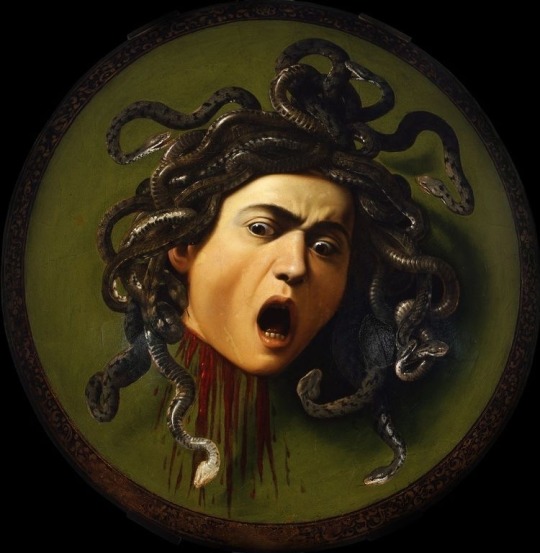



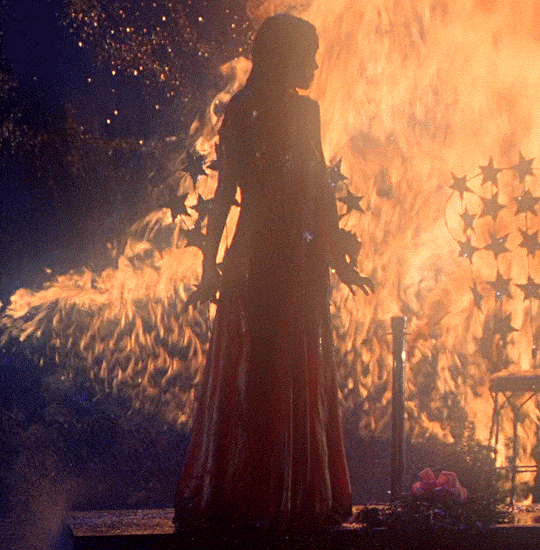


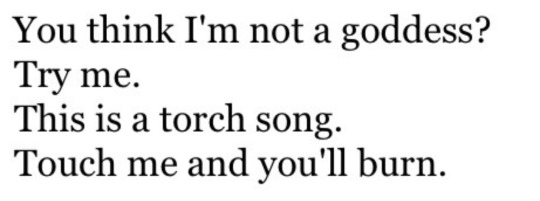
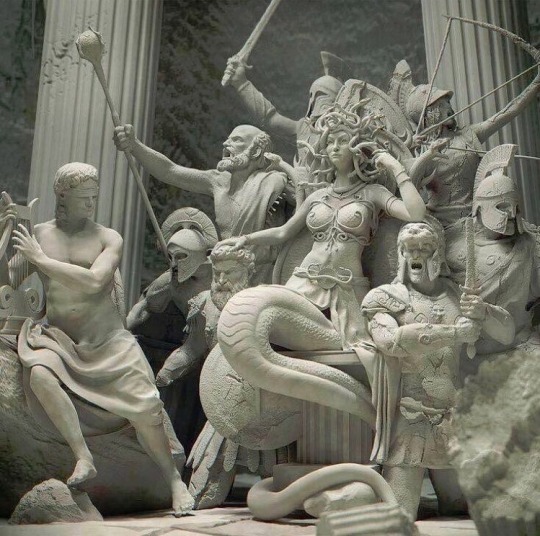
—female rage
? // medusa by caravaggio // gregory radionov // artemisia gentileschi // monstrous flesh: on women’s bodies in horror by rebecca harknis-cross // carrie (1976) // corruption by camille norton // midsommar (2019) // helen of troy does countertop dancing by margaret atwood // medusa in her throne by reza sedhi
#words#art#web weave#medusa#girlhood#female rage#feminine rage#womanhood#caravaggio#artemisia gentileschi#midsommar#florence pugh#ari aster#margaret atwood#reza sedhi#web weaving#prose#poetry#comparatives#carrie 1976#carrie#rebecca harkins cross#camille norton
4K notes
·
View notes
Photo

“Margaret must have been devastated when she heard of Henry’s condition but there was little that she could do and it must have been with a heavy heart that she entered her confinement in London in September.”
- She Wolves: The Notorious Queens of Medieval England by Elizabeth Norton.
Margaret of Anjou prays before she retires to her confinment. She is quite anxious and worried about her husband's health and the future of the kingdom of England, so I imagined her becoming very vulnerable. It's an intimate moment, she entrusts both her worries and her tears to God, only out of love for her beloved Henry.
#the wars of the roses#15th century#medieval#medieval england#middle ages#medieval fashion#fanart#british history#sketch#illustration#digital art#artists on tumblr#my art#house of lancaster#plantagenets#edward iv#elizabeth woodville#elizabeth of york#margaret of anjou#henry vi#isabel neville#richard iii#character design#the white queen#the white princess
215 notes
·
View notes
Text
When I first saw people saying that Lucius could have worked at a molly house pre-piracy I really loved the idea. However lots of people seem to be under the mistaken impression that molly houses were brothels. While there is evidence that there were prostitutes that had agreements with molly houses (and Lucius could have worked with a molly house in this capacity), molly houses were more akin to a gay bar than a brothel. So what sort of jobs might there have been at a molly house?
Bartender. While some molly houses seem to have been in public houses many were in private houses. Either way there tended to be plenty of alcohol and someone must have been responsible for serving it.
Musician. Molly houses would sometimes have live music.
In a large Room there we found one a fiddling, and eight more a dancing Country Dances, making vile Motions, and singing, Come let us —— finely.
(the trial of Thomas Wright, April 1726)
Rictor Norton suggests the censored word is “bugger”. (Mother Clap’s Molly House p61)
The chapel attendant. Molly houses usually had at least one room with a bed in it known as the marrying room or the chapel. Patrons could either close the door for privacy or keep it open if they wanted an audience. In cases where privacy was desired the attendant's job was to ensure that privacy.
Then they'd go by Couples, into a Room on the same Floor to be marry'd as they call'd it. The Door at that Room was kept by - Ecclestone to prevent any body from balking their Diversions.
(the trial of Margaret Clap, 11 July 1726)
Not directly related to molly houses but another job a molly in need of money could have done was “sodomiting Errands”. Which really just means carrying messages between mollies.
Margaret Holder: I believe the Prisoner is an honest Man; but the Prosecutor and Kitt Sandford too, use to come to my Cellar with such sort of People.
Court: What sort of People?
Holder: Why, to tell you the Truth, he's one of the Runners that carries Messages between Gentlemen in that way.
Court: In what way?
Holder: Why he's one of them as you call Molly Culls, he gets his Bread that way; to my certain Knowledge he has got many a Crown under some Gentlemen, for going of sodomiting Errands.
(trail of Thomas Gordon, 5 July 1732)
#our flag means death#lucius spriggs#historical fiction#mollies#keeping a brothel and keeping a molly house were more or less considered the same crime because both premises involved illicit sex#but molly houses were not in fact brothels#however in the 19th century there was at least one establishment that was both a molly house and a brothel#so there is nuance
155 notes
·
View notes
Text
There is little information for Anne's time in Brussels, although it is apparent that she impressed Margaret and that she rapidly learned French. It is possible that she caught her first glimpse of Henry VIII when Margaret and her court moved to Lille in August 1513 to meet with the English king and his retinue.
Anne Boleyn: In Her Own Words & the Words of Those Who Knew Her (Norton, Elizabeth)
12 notes
·
View notes
Text
349. Margaret Weis and Tracy Hickman - Dragons of Autumn Twilight (1984)
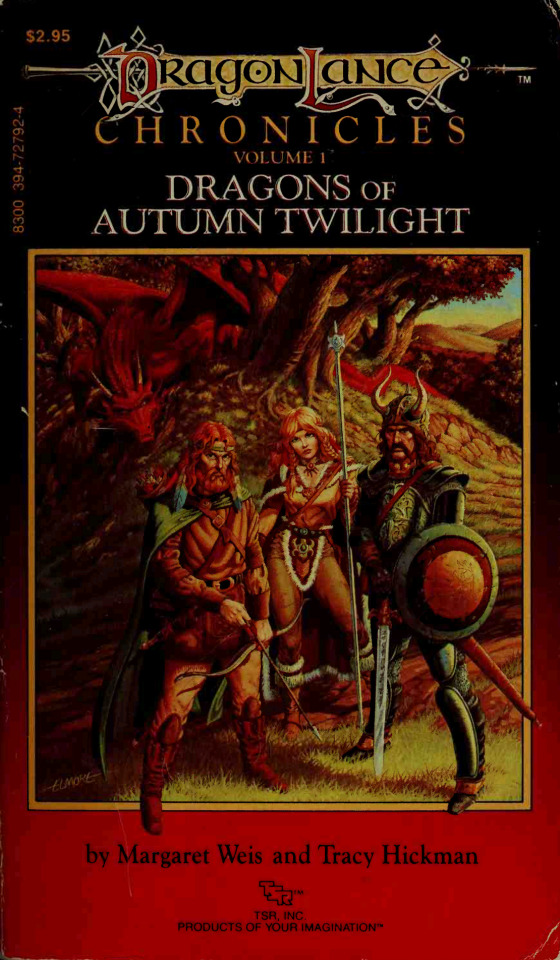
This marks a real sea change in D&D in general and in TSR's business model in particular. This was the first novel based on D&D material to come out since Andre Norton's Quag Keep back in 1978, but while Norton's book was an independent story based on the game, this first volume in what would become the Dragonlance Chronicles is part of a concerted business and storytelling strategy by TSR.

Moving from the more loosely structured modules to the revolution led by the Hickmans (Tracy and Laura), to more story centred stories, starting with Ravenloft and then Dragonlance, this was integrated with a new novel publishing side of the company. Dragonlance would be so successful that now, nearly 40 years later there are still novels by Weis and Hickman set in this universe coming out yearly.

Personally, this was also an important novel for me. Before I knew that there was a game called D&D, before I saw the cartoons... even before I heard of Lord of the Rings, I got my hands on cheap paperbacks of this novel. This was my entry into the world of fantasy and later science fiction. Over the years I've read and reread this novel time and time again, and it always takes me back to being 7 or 8 years old with its compelling characters, non-stop action and exciting story, which I now understand mimics the experience of a party around a game table. It is also a really easy read, which explains why it made such an impression at such an early age. Still a classic, still immense fun.
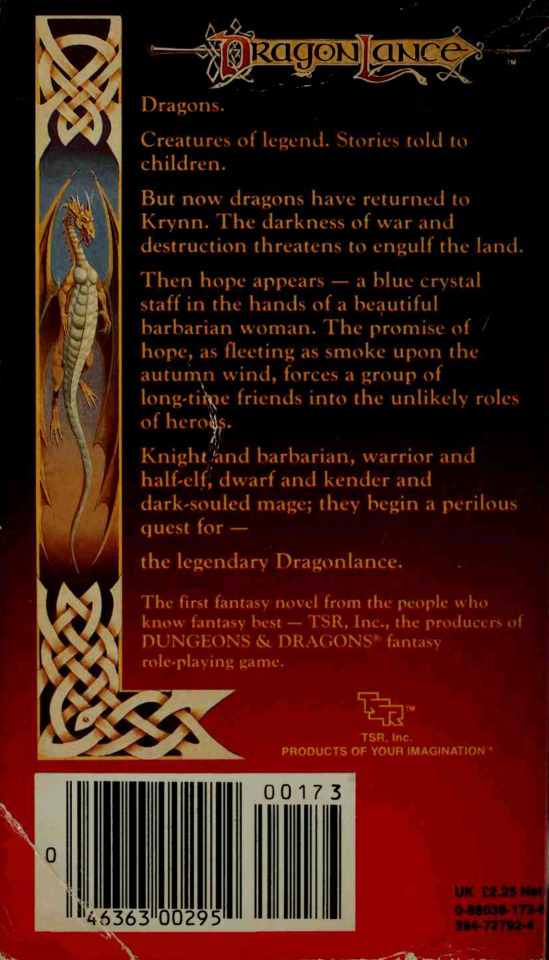
#dnd#ttrpg#adnd#ad&d#d&d#dnd art#dungeons and dragons#dungeons & dragons#margaret weis#tracy hickman#dragonlance
27 notes
·
View notes
Text
My former English professor is retiring and gave away a bunch of the books in her office. She's a gem. I giddily returned to campus just to sort through her collection. Super excited about the ones I brought home with me. I thought someone else might appreciate some of the books I found.
I've already began poring over the poetry collections, but what should I read first? Are there any that you guys have read that you highly recommend?
Books included in Photo 1:
● Sense and Sensibility by Jane Austen (Alta Edition includin Persuasion)
● Robert Burns by David Daiches
● Far From the Madding Crowd by Thomas Hardy
● Leigh Hunt's What is Poetry? by Albert S. Cook
● Love Letters Between a Nobleman and His Sister by Aphra Behn
● Virginia Woolf: A Biography by Quentin Bell
● Holy Madness: Romantics, Patriots, and Revolutionaries 1776-1871 by Adam Zamoyski
● Earnest Victorians by Robert A. Rosenbaum
● Lord Byron: Selected Letters and Journals by Lord Byron, Leslie A. Marchand (Editor)
Books Included in Photo 2:
● Orlando by Virginia Woolf
● Brave New World by Aldous Huxley
● The Portable Irish Reader, (The Viking portable library) by Diarmuid Russell
● The Last Days of Pompeii by Edward Bulwer-Lytton
● Becoming a Heroine by Rachel M. Brownstein
● To the Lighthouse Virginia Woolf
● East Lynne by Ellen Wood, writing as Mrs Henry Wood
● Poetry and Prose of Alexander Pope edited by Aubrey Williams
● In Memoriam; An Authoritative Text, Backgrounds and Sources, Criticism (Norton Critical Editions) by Alfred Tennyson
● Daughters and Fathers by Lynda E. Boose, Betty S. Flowers
Books Included in Photo 3:
● Jude the Obscure by Thomas Hardy
● A Sentimental Journey by Laurence Sterne
● Goblin Market and Other Poems by Christina Rossetti (Dover Thrift Editions)
● Sound the Deep Waters: Women's Romantic Poetry in the Victorian Age includes works by Christina Rossetti, Elizabeth Barrett Browning, George Eliot, Alice Meynell, and Edith Nesbit
● The Jane Austen Book Club by Karen Joy Fowler
● The Monsters: Mary Shelley and the Curse of Frankenstein by Thomas Hoobler and Dorothy Hoobler
● Wordsworth and the Poetry of Human Suffering by James H. Averill
● Victorian Ghost Stories: By Eminent Women Writers (Part of the The Virago Book Series) edited by Richard Dalby
● The Blind Assassin by Margaret Atwood
● Victorian Poetry and Poetics by Walter E. Houghton G. Robert


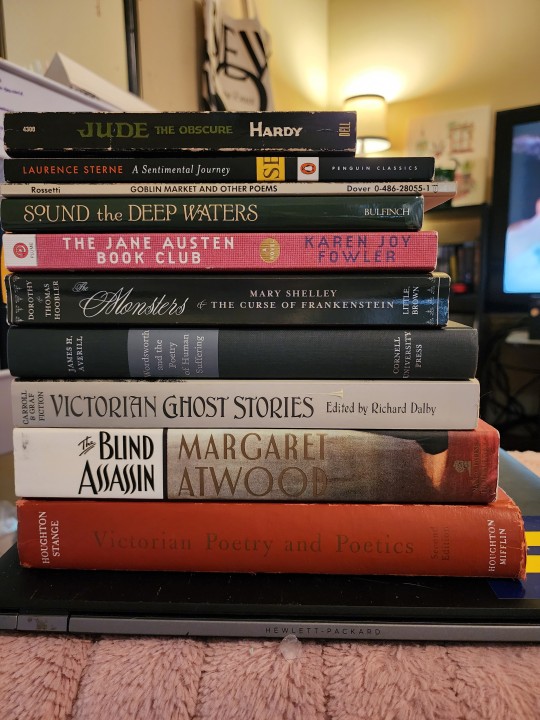
#bookish#bookworm#books#book haul#booklr#book tumblr#books and literature#booklover#booksbooksbooks#books & libraries#bookblr#book blog#women reading#reading#literature#english literature#literary fiction#literary#margaret atwood#jane austen#thomas hardy#virginia woolf
53 notes
·
View notes
Note
Hi ddtf! So i was wondering.. if you could cast anyone to play the characters in your fics who would you choose? I have completely fancasted TSNC and the feature in my head and would love to see how close I am to what you envision
Love you and your writing 🩵
Oh I love this question and am 100% about to give way more info than anyone wants or asked for.
Thou
F. Ben - BC obviously. But specifically for me it’s Sherlock era Ben (s2 to get even more specific). But I know there’s readers who imagine him completely differently which is really interesting.
Ellis - Margaret Qualley is who I’ve been picturing a lot while writing. But I could also see someone like Laura Harrier, Victoria Pedretti or Marine Vecth. They all have Ellis vibes to me.
Mara - Kate Beckinsale. Or maybe Emily blunt, or Zawe Ashton. Oooh imagine Zawe Ashton and Laura Harrier playing sisters *chef’s kiss*
Alfie - James Norton
Gina - Suki Waterhouse, but with that rich party girl aesthetic of a 2012 Peaches Geldof
I haven’t really put much thought into any characters beyond these 5.
The feature
Ben - sexy QUEUE photoshoot Ben obv
Quinn - totally undecided, but I do find myself picturing Mara Lafontan a lot when writing Quinn (even though she’s not an actor). Only difference is I imagine Quinn having collarbone length hair with lots of layers, very 90s inspired.
Nick - Robert Sheehan
Lacey - Simone Ashley
Faye - Elizabeth Mitchell
Dan - Iwan Rheon
Ellen Ford - Helen Mirren
But honestly when it comes to the main characters in these fics (the reader), I purposely try to avoid physical descriptions as much as possible. Though I don’t doubt I probably haven’t done it perfectly, my main goal is for anyone to be able to read my stories and identify in some way or another with the reader, regardless of physical features, race, ethnicity, size, body type, hair colour/texture/style etc.
Whatever you picture my characters to look like, you’re correct. Lmao.
14 notes
·
View notes
Text
One of my favourite Margaret Beaufort moments is when she asked her son the king to help bamboozle her husband.

“[...] If it will please your majesty’s own heart, at your leisure, to send me a letter, and command me that I suffer none of my tenants be retained with no man [...] it shall be a good excuse for me to my lord and husband.”
Elizabeth Norton says it’s possible that Margaret asked Henry VII to pretend he was giving her a command so as to spare her husband’s feelings, but it’s fascinating to see how Henry would really go on to declare her the first Englishwoman licensed to hire retainers in the king’s name.
#those two were thick as thieves#margaret beaufort#henry vii#primary sources#historian: elizabeth norton
28 notes
·
View notes